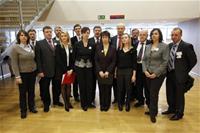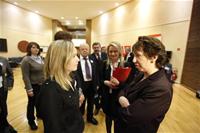The Belorussian opposition is looking for EU's support
Angel Shoilev Junior, January 19, 2011
 Representatives of the opposition in Belarus visited the European Parliament, looking for support against the violence which the authorities in Minsk exercised recently. In the framework of their visit in Brussels they met with EU's High Representatives for Foreign Affairs, Catherine Ashton. The Belorussian delegation consisted of Eva Nikolaeva - a daughter of the arrested candidate for president Vladimir Nikolaev, as well as Irina Bogdanova - a sister of another presidential candidate - Andrey Sannikov. During their meeting Catherine Ashton again emphasized EU's solidarity and support for all political detainees after the elections on December 19th last year.
Representatives of the opposition in Belarus visited the European Parliament, looking for support against the violence which the authorities in Minsk exercised recently. In the framework of their visit in Brussels they met with EU's High Representatives for Foreign Affairs, Catherine Ashton. The Belorussian delegation consisted of Eva Nikolaeva - a daughter of the arrested candidate for president Vladimir Nikolaev, as well as Irina Bogdanova - a sister of another presidential candidate - Andrey Sannikov. During their meeting Catherine Ashton again emphasized EU's solidarity and support for all political detainees after the elections on December 19th last year.
After meeting the delegation, Catherine Ashton spoke to the foreign minister of Belarus, Sergey Martyanov. The High Representative again reprimanded the Belorussian authorities for the violence-prone measures they undertook against the protesters after the elections. She insisted for the immediate release of all political detainees, as well as for putting an end to the prosecution of opposition activists and ordinary citizens.
Ms Ashton recalled to Sergey Martyanov that the EU was looking for appropriate measures to respond to the post-election events. As euinside reported, the EU was preparing a list of over 100 Belorussian officials, including president Alexandr Lukashenko, who could be banned from entering the EU. The final decision on the matter is expected to be taken at the first for this year Foreign Affairs Council on January 31st.
In spite of the sharp reactions of the international community, the Belorussian authorities continued attacking opposition leaders, various media reported. For example the homes of the detained Andrey Sannikov and his wife, Irina Khalip, was searched, as well as the home of Irina's mother - Lyutsina Khalip who was taking care of their 3-year old son while his parents were in jail. After the search the authorities threatened to take the child away, the New York Times wrote. Ms Lyutsina Khalip claims for the newspaper that she has signed "an agreement" in which she promises not to reveal any details about the search. In a telephone interview for the paper she says: "I cannot say anything or I risk things to get worse".
According to the New York Times, the searches are a part of the enhancement of the regime over the opponents of president Alexandr Lukashenko. Almost daily the security services, still called KGB, "attack" offices and homes of people, related to the opposition. They are being interrogated and their computers, as well as other "risky" materials - confiscated, human rights organisations say. In fact, the hope of Belorussian opposition leaders is directed to the European Union. In the second decade of the 21st century, in a country geographically part of Europe, there are still non-free people who rely on the European values and the will of European democracies to set them free.
The EU should pay more serious attention to these calls and look around itself -  already a significant part of the Union consists of countries who divorced not long ago from their Soviet-Totalitarian past. Some of them successfully, others - not that much. Precisely because of the latter the EU should not limit its reactions to just condemning violence and to making ban-lists. Experience shows that this does not work. Furthermore, there is always someone inside the EU to oppose such measures (like the Italian premier Silvio Berlusconi).
already a significant part of the Union consists of countries who divorced not long ago from their Soviet-Totalitarian past. Some of them successfully, others - not that much. Precisely because of the latter the EU should not limit its reactions to just condemning violence and to making ban-lists. Experience shows that this does not work. Furthermore, there is always someone inside the EU to oppose such measures (like the Italian premier Silvio Berlusconi).